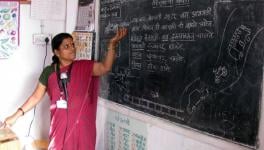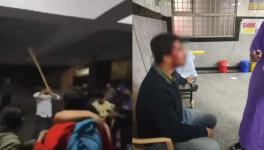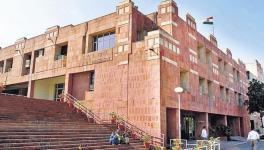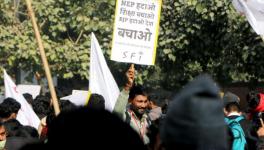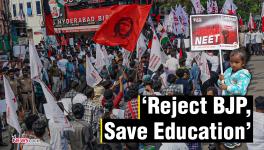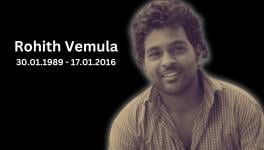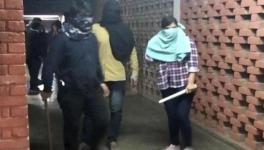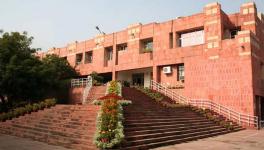JNUTA: Not Just Education, Empathy and Intellect Being Attacked too, say Academicians
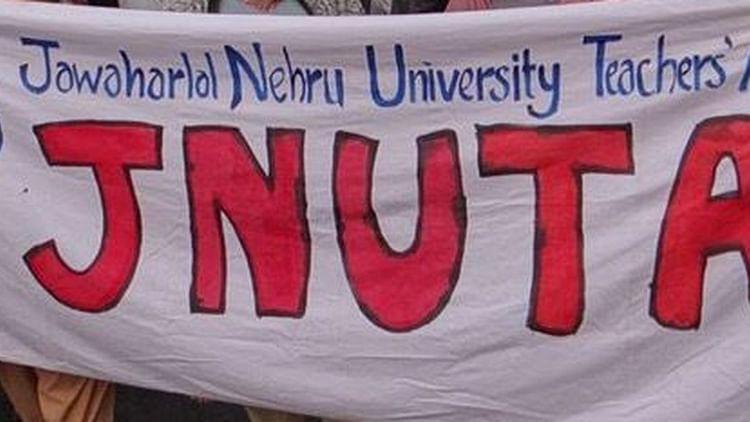
The JNUTA celebrated its 50th anniversary on Tuesday, February 20, with book and photo gallery exhibitions, talks and poetry recitation events. (File photo/Credit: National Herald)
New Delhi: Public universities are places of critical enquiry. The universities have managed to create an ethos where critical thoughts are respected….The importance of public universities lies in widening the access to education, said noted political scientist Prof Zoya Hasan.
The occasion was celebration of Jawaharlal Nehru University Teachers Association’s (JNUTA) 50th anniversary in the campus on Tuesday.
Prof Hasan was part of a panel discussion hosted by litterateur Badri Raina, and included professors Nandita Narain, Rupamanjari Ghosh, Anand Teltumbde, Rupamanjari Ghosh and N Raghuraman.
Addressing the gathering, Hasan said that “we must remember that public universities have been at the centre of modern higher education systems in the every country including the US. However, the dominant place of public universities is being contested. We must understand that the future of higher education is bound up with public universities particularly when the objectives of building a democratic and inclusive society is to be fulfilled. Government has to take responsibility of providing education, that’s unexceptional and a policy which must be upheld.”
She said this was necessary because one, education in private universities was extremely expensive and beyond the reach of many students, whereas public universities provide access and guarantee inclusivity.
“One of the fascinating things about public university remains that it brings a great mix of classes, castes, genders and ethnicities and it must be valued.”
Second, public universities are also places of critical enquiry. The universities have managed to create ethos where critical thoughts are respected,” she said.
Third, the importance of public universities lies in widening access to education. “Even before the implementation of 27% reservation to other backward classes or OBCs, the universities were diversified places, and now bringing together of students from different backgrounds brings different strands of thoughts and debates and it must be valued too.”
Prof Hasan said the challenges for public funded universities were grave as many state universities were in dismal condition because of inadequate funding. Hence, they largely depend on contract teachers to impart education.
“So, we have two classes of universities, good Central universities and struggling state universities. Despite increase in gross enrolment ratio (GER), we have not reached the level of GER of European countries and the US because public spending has stagnated in comparison with growth in GDP (gross domestic product), she said, adding that “this brings us to the question of academic freedom in the country which I think have been curbed due to pervasive political culture.”
Nandita Narain, former Delhi University Teachers Association (DUTA) president said universities were places where “society learns to speak with itself”. It is place where students and teachers share their journeys and think about contributing to the societies. In order to enable every student to come to the campus and contribute to the society, it must be free not just affordable because governments are not promising anything on jobs. So, at least health and education should be made free and accessible to all. JNU offered deprivation points. We (DUTA) fought for it but never got it.”
Narain said they were seeing a different challenge in the form of Common University Entrance Test (CUET) in Delhi University.
“Not only is CUET being conducted through dubious entities, it has also eradicated the possibility of selection of students from state boards due to its over dependence on CBSE (Central Board of Secondary Education) syllabus. The students and parents are scared of it,” she added.
“First, you buy laptop or send your child to a computer centre to make him computer literate, then spend thousands of rupees on coaching. Even then you are not selected,” she said.
Narain cited the case of the first batch of her class in St Stephens Colleges post-CUET, which had students from only three states -- Uttar Pradesh, Haryana and Rajasthan.
“In 50% of Christian quota (in St. Stephens), I always asked if students were comfortable in Hindi or English and students always emphasised on English. This time, the students said that they wanted classes in Hindi because even when some of the Christian students are South Indian origin, they were settled in North India. So, the test has completely changed the profile of students in our classes. The number of girl students have dropped significantly by 30%”, she said.
On curbs on academic freedom, the former DUTA president said: “I can tell you that there is a bully gang which is looking after everything l and arbitrarily suggesting that Ambedkar and Gandhi from the syllabus should be dropped or put it later. They will not allow the word ‘discrimination’ in the syllabus of economics. Moreover, I must say that there was a war on terror a decade ago. There is a war on intellect and empathy today. Education also taught us empathy for the distressed. What’s happening in Palestine does not invoke empathy now!”
Prof Anand Teltumbde, a well-known Dalit rights activist, said the government must ensure that education was imparted freely to all because it was the only resource that could create hope in people.
“Currently, government has no policy for redistribution of land or wealth. So, it is education which can be redistributed. Education is deeply connected with employability. People would get jobs and make their lives better. Similarly, it used to make us a cultured citizen. Now, both the objectives are going away. I think technology has played a great part in it. Post-pandemic, our understanding of university is changing because many Internet giants like Amazon, Google, Microsoft etc are working on online education. Similarly, universities like Harvard and others have tied up with them,” he said.
Prof Teltumbde pointed out that universities were also being “demeaned by Right wing elements” for being inclusive.
“Our Prime Minister Narendra Modi gave the ‘hardwork versus Harvard’ statement. I could sense why every institution, including universities, had fallen apart without much effort. I could point out that the leadership of the institutions was always with upper castes who had a Hindutva inkling. Under the British government and the post-Independence regimes, they behaved liberally because of training, but soon crawled when asked to bend by Modi government. This trend must be fought,” he added.
The participants also recounted the old days of struggle in the Emergency era by JNUTA and the role of the teachers’ association as a trade union body in the future.
The celebrations of JNUTA’s 50th anniversary was also marked by a book and photo gallery exhibition, talks and poetry recitation events.
Get the latest reports & analysis with people's perspective on Protests, movements & deep analytical videos, discussions of the current affairs in your Telegram app. Subscribe to NewsClick's Telegram channel & get Real-Time updates on stories, as they get published on our website.










